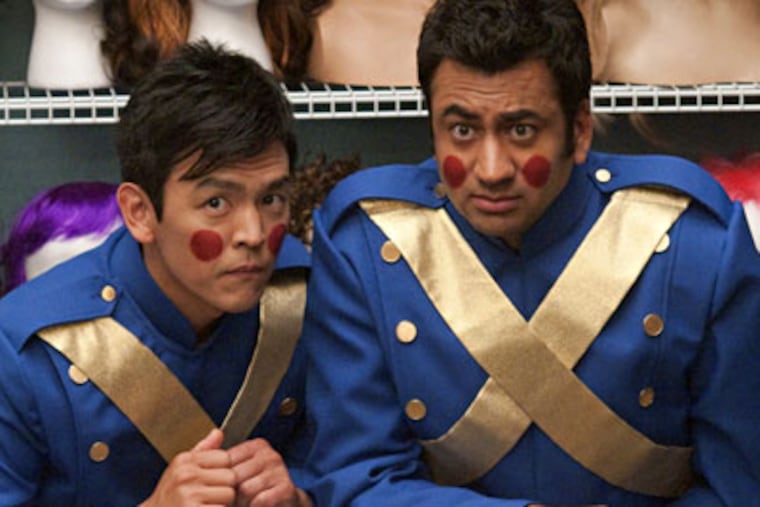The Harold & Kumar worldview
Another chapter in the stoner comedy is coming, but behind the scenes it's a different story for the two stars.

In A Very Harold & Kumar 3D Christmas, the titular stoners want to sneak into a holiday party thrown by the daughter of a Russian mobster so they can steal his Christmas tree. (It's a long story.)
To get them in, Kumar's roommate takes the liberty of bending the truth; on the elevator ride up, he confides, "I told her you worked at the White House."
"Like anyone would believe that," snorts Kumar, who seems to have spent the years since the previous movie smoking pot and wearing a hole into his couch.
Of course, as any viewer of the Harold & Kumar movie series knows, Kal Penn, who plays Kumar, did indeed spend part of the intervening years in the Obama administration as an associate director in the White House Office of Public Engagement. And when someone offhandedly refers to Harold, Kumar's partner in crime, as "Sulu," fans won't miss the reference to John Cho playing that role in the recent reboot of the Star Trek franchise, when 3D Christmas opens here Friday.
Since Harold & Kumar Escape From Guantanamo Bay in 2008, it's been a very busy time for the duo, or at least for Harold, who's gotten married and is now juggling the role of a nervous son-in-law with his wife's desire to have children.
But that character's dilemma is nothing compared to what's happened for actors Penn and Cho during the same time period.
Penn, 34, was born in Montclair, N.J., and graduated from Freehold Township High School before heading to UCLA. In addition to his stint in Washington, he's been a regular on House M.D. (his character committed suicide so he could take the White House job), he made a successful transition to big-screen drama with the adaptation of Jhumpa Lahiri's The Namesake, and he taught classes on teen films and images of Asian Americans at the University of Pennsylvania under his given name, Kalpen Suresh Modi. Cho shot a season of the sci-fi drama Flash Forward, and he's gearing up for another Star Trek movie.
The advertising campaigns for 2004's Harold & Kumar Go to White Castle billed Cho and Penn as "the Asian guy from American Pie and the Indian guy from Van Wilder," a tongue-in-cheek reflection on the practice of giving nonwhite actors bit parts in the otherwise blindingly vanilla world of frat-boy comedy. In fact, said Jon Hurwitz and Hayden Schlossberg, who wrote all three movies and directed the second, Harold and Kumar began life as supporting characters who kept turning up in the scripts the fledgling duo wrote while Hurwitz was a student here at Wharton.
"In the world we knew, those were our friends," Hurwitz recalls. "We always talked about, 'Wouldn't it be amazing to have Harold and Kumar be the protagonists in a film?' "
White Castle took in a modest $18 million at the box office, but it became a favorite in dorm rooms and on DVD. It not only launched Penn and Cho's careers, but revamped the image of former child star Neil Patrick Harris, who in a parodic take on Hollywood excess, played himself as an unstable, ecstasy-dropping horndog. That part led directly to his role as an insatiable skirt-chaser on the hit sitcom How I Met Your Mother, on which Penn will guest-star in several episodes while prepping his own sitcom set at the United Nations.
"I didn't think I'd ever have the opportunity to play the lead in a mainstream movie," Penn reflects in an interview. "Hollywood's always a little bit behind the curve in terms of what's out there in the country. You're growing up and you know that a young audience doesn't care what characters look like, especially their ethnic background, but it's not clear that message is getting through."
When he was growing up in Montclair, Penn remembers, "the only brown dude on TV was Apu from The Simpsons."
Now, Penn says, "I talk to some of the young guys that are seeing these movies, and they're like, 'Man, every time I go to a bar, I get called Kumar!'
"'You know what, brother? It's better than Apu," Penn says of his response.
Penn points to shows like Modern Family and Community as evidence that the viewing culture has shifted. Cho says he's been getting different questions from journalists this time around.
For the first two movies, he says, the characters' race "was all we talked about. I learned that's what people clock first, the color of a person. This time, we're not necessarily talking about the politics of race in America - I'm not sure actors are the best people to talk about that - and when we are, the questions don't overwhelm the discussion."
At 39, Cho is also substantially older than his Harold & Kumar character. But perhaps because of how the franchise's audience skews, both actors feel like they've gained insight into the way younger people see the world, an experience that's left them with surprisingly optimistic worldviews.
The success of the movies, Cho says, "speaks to a different tone in the country. For the first movie, it was months and months of justifying why there was a Korean guy and an Indian guy in a theatrical motion picture. There's no need anymore. It's been done."
As for Penn, his time inside Washington's sausage factory has only strengthened his belief in the positive power of government.
"I'm less cynical now than I was before," he says, "and that's because of looking at the part young people play in the governance process. Young people don't get enough credit for the positive things that they do; the media tends to report on things that are new or somehow titillating. But the difference between a dictatorship and a democracy is that change takes time."